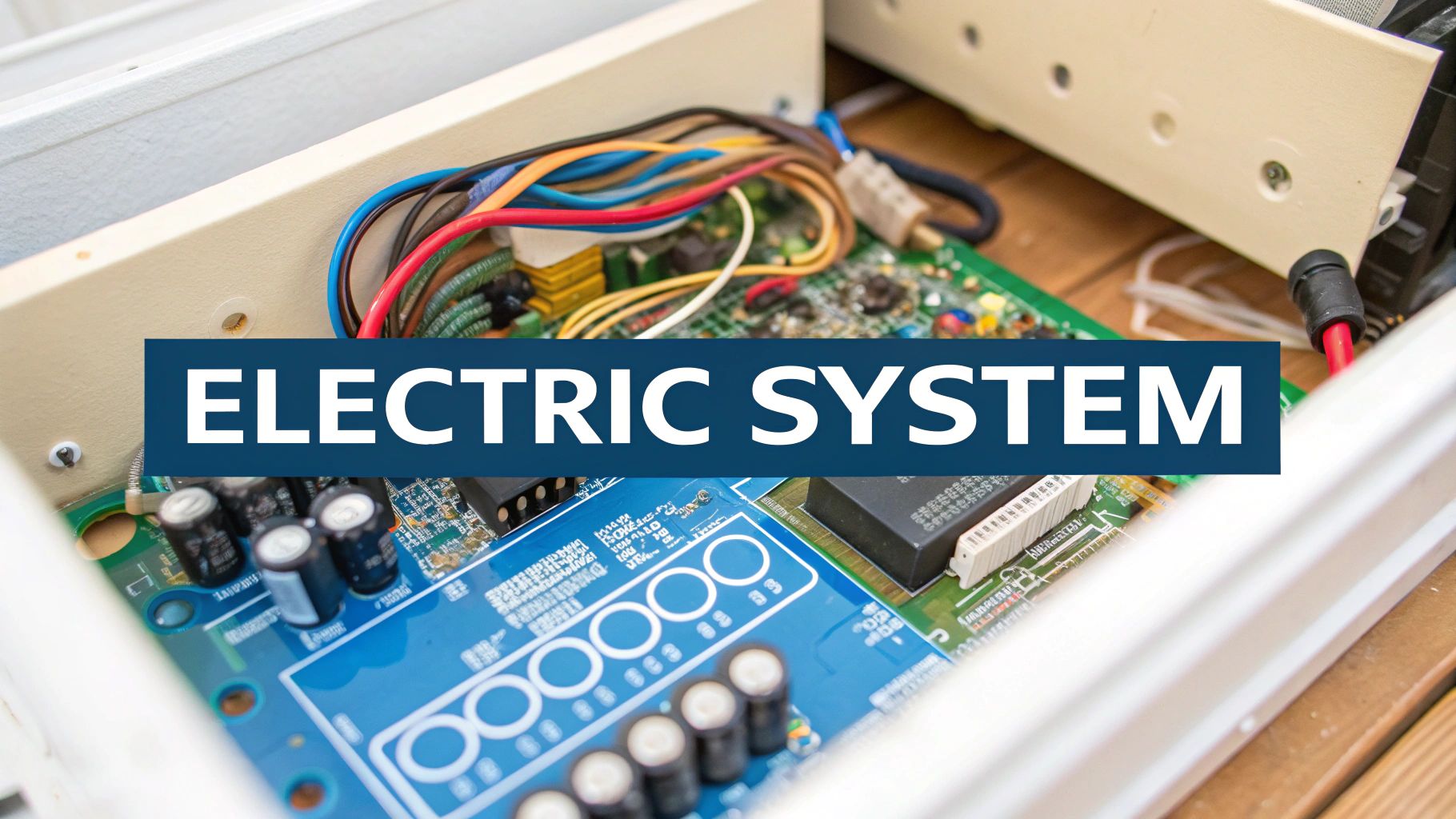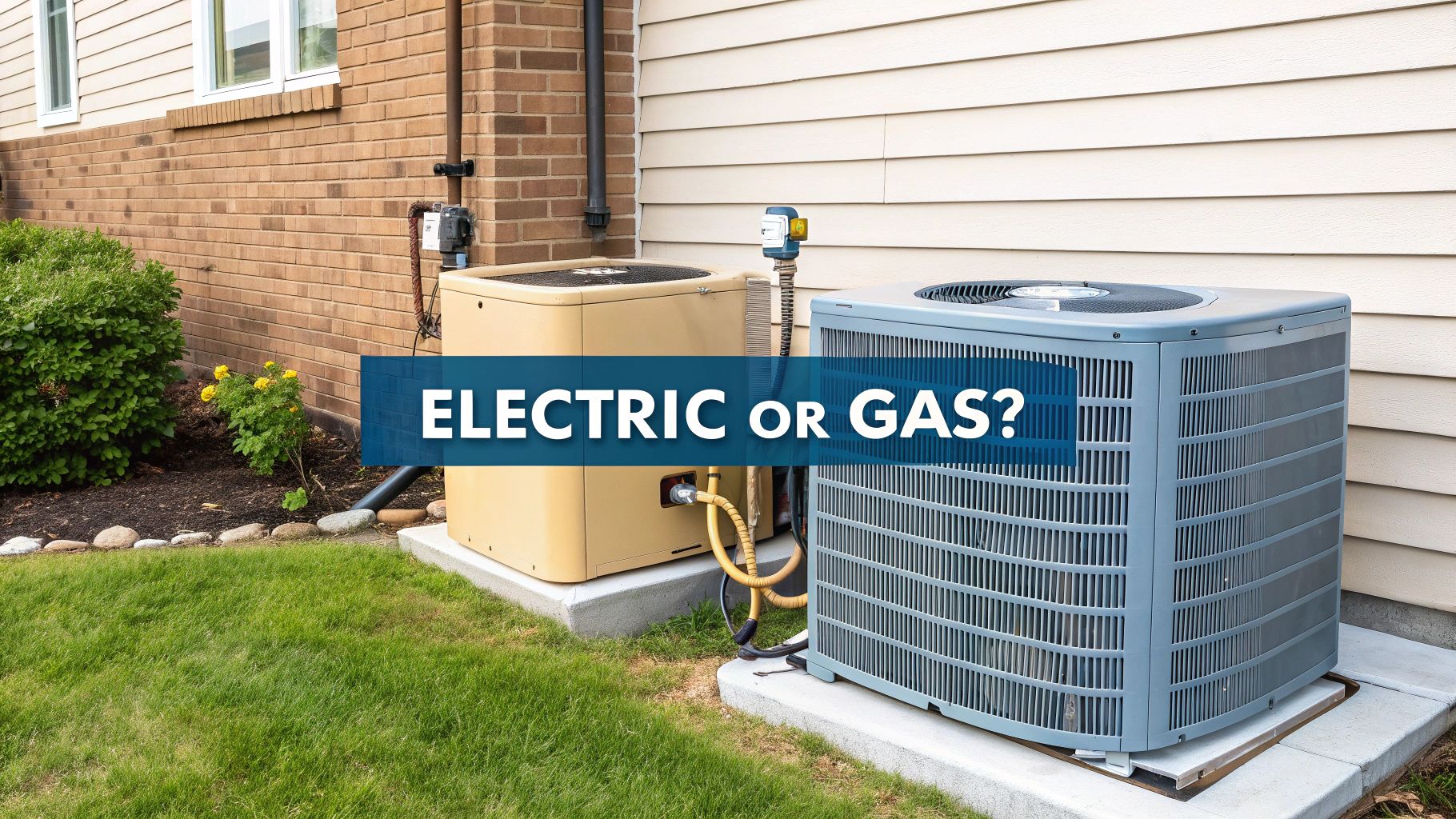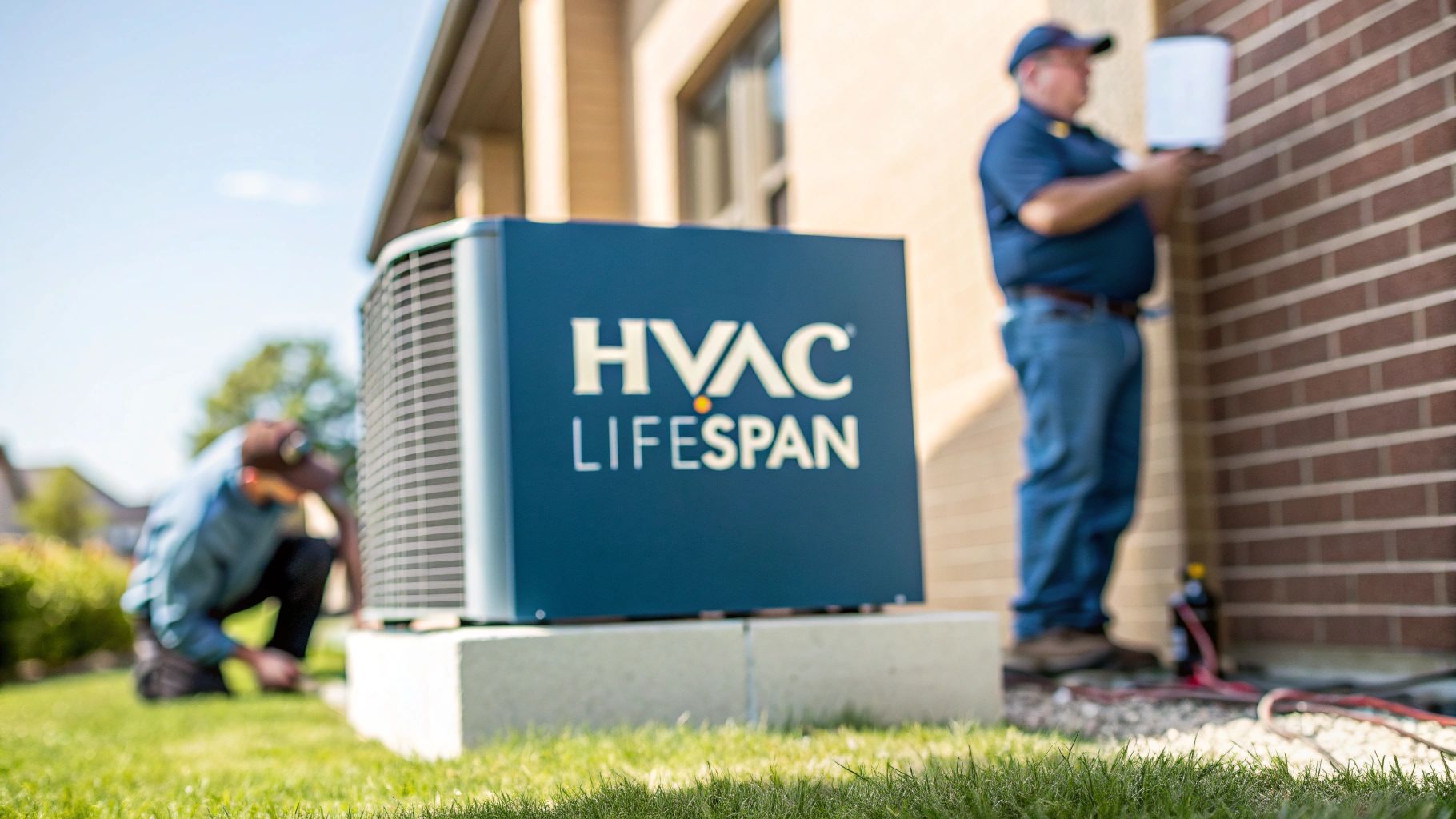Let's get right to it: your central air conditioner cools your home using electricity, not gas. The easiest way to think about it is like a refrigerator, but for your whole house. Just like your fridge, it needs to be plugged in to run the compressor—the engine that actually makes the cold air.
How Your Central Air Gets Its Power

So where does the confusion between gas and electric come from? It usually comes from thinking about the entire HVAC (Heating, Ventilation, and Air Conditioning) system as one single unit. Many homes, especially up north, have a gas furnace for heat and an electric AC for cooling, all bundled together.
But when we're talking about just the cooling part, it’s all electric. The system works by pumping a refrigerant through coils, and electricity is what powers the compressor and the fans that make this happen. Gas simply doesn't play a role in the cooling process for a standard central air system.
Knowing this difference is a big deal. For example, if your AC stops working on a sweltering July day here in Palm Beach County, you know you're dealing with an electrical issue, not a problem with your gas line. For a deeper dive into modern AC tech, you can explore the central AC market trends to see what's new.
Electricity vs Gas in Home HVAC Systems
To clear things up completely, it helps to see exactly what each power source does. This simple breakdown shows how electricity and natural gas have very different jobs in your home's comfort system.
Here's a quick summary of their primary roles.
| Power Source | Primary Role in Cooling | Primary Role in Heating |
|---|---|---|
| Electricity | Powers the compressor, fans, and controls for the entire cooling cycle. | Runs electric furnaces, heat pumps, and the blower fan in gas furnaces. |
| Natural Gas | Not used for the cooling function in standard central air conditioners. | Fuels a gas furnace to generate heat, common in hybrid systems. |
As you can see, when it comes to keeping your home cool, electricity is doing all the work. The compressor is the heart of your AC, and it runs entirely on electricity. Bottom line: no power, no cooling.
How Your Electric Central Air Conditioner Works

To really get why the answer to "is central air electric or gas?" is always electric, let’s take a peek under the hood. Your central AC system works a lot like your refrigerator, just on a much bigger scale to cool your whole house instead of a small, insulated box.
This cooling magic happens through a continuous cycle run by a few key electrical parts. The most important one is the compressor, which sits in your outdoor unit. Think of it as the heart of the system. It uses electricity to pump a special cooling fluid, called refrigerant, through a loop of pipes.
If the compressor doesn't have electricity, that heart doesn't beat. The whole cooling process stops before it can even begin.
The Cooling Cycle, Step by Step
Your AC is basically a heat-moving machine, and electricity is what makes it go. It’s a constant loop where heat is grabbed from inside your home and dumped outside. Here’s a simple breakdown:
- Inside Your Home: A fan pulls warm air from your rooms across a chilly evaporator coil. The refrigerant flowing inside this coil acts like a sponge, soaking up the heat from the air.
- Pumped Outside: The now-warm refrigerant travels to the outdoor unit, where the compressor pressurizes it, making it super hot.
- Heat Dump: A second fan in the outdoor unit blows air over the condenser coils, pushing all that captured heat out into the Florida air.
- Back to Work: The refrigerant, cool once again, heads back inside to the evaporator coil to grab more heat. This cycle runs over and over, keeping you comfortable.
Key Takeaway: Every critical part of this process—the compressor, the indoor fan, and the outdoor fan—runs on electricity. Natural gas simply has no part to play in moving heat from inside your home to the world outside.
This is the same fundamental design that's been keeping people cool for over a century. The first modern AC units, developed way back in the early 1900s, all used electric motors to power the system.
Understanding this process helps clarify what is central air conditioning: it’s a smart, electrically-driven machine designed to transfer heat and provide comfort for your entire home.
Understanding Hybrid Systems: The Gas and Electric Partnership

So, where does all the confusion about "is central air electric or gas" come from? Most of the time, it boils down to a specific setup called a hybrid or dual fuel system.
Think of it like having two specialized tools in one box. This system cleverly combines an electric air conditioner for cooling with a natural gas furnace for heating.
During a sweltering Palm Beach County summer, the system acts just like any other central AC unit you're familiar with. It uses electricity to run the compressor and fans, pushing cool air through your home. In this mode, the operation is 100% electric, and the gas furnace is completely off duty.
The partnership kicks in when the weather gets chilly. To really get why this matters, it helps to know the common uses for gas in a house, and in a hybrid system, the furnace is a prime example.
How a Hybrid System Chooses Its Fuel
The real magic of a dual fuel system is its brain. It uses a smart thermostat to automatically pick the most efficient heating source depending on the temperature outside, acting like a savvy manager for your energy bills.
Here's a peek at its decision-making process:
- For Mild Chills: On those cooler days, it sticks with electricity, using the heat pump function (which is part of the AC unit) to provide gentle, highly efficient warmth.
- For Colder Weather: When the temperature really drops, usually below a set point like 35-40°F, the system knows the electric heat pump starts to struggle. At that threshold, it automatically switches off the electric heat and fires up the powerful gas furnace to heat your home fast.
This seamless switchover ensures you're always using the most cost-effective fuel for the job.
In short, a hybrid system aims to give you the best of both worlds: ultra-efficient electric cooling and heating for mild weather, plus the raw power of gas for those rare deep freezes. While these systems are less common here in sunny Florida, understanding how they work is the key to finally settling the electric vs. gas debate.
Comparing All-Electric and Hybrid HVAC Systems
When it comes to choosing a new home comfort system, you'll generally find yourself deciding between two main setups: an all-electric system or a hybrid one. Making the right choice has a real impact on everything from the upfront installation cost to your monthly energy bills and even your family's safety. For those of us living in Palm Beach County, knowing the difference is crucial.
Let's break them down.
An all-electric system is what you’ll see in most Florida homes. It’s a combination of a standard electric air conditioner and an electric heat pump, which handles the heating during our pretty mild winters. The whole setup—both cooling and heating—runs entirely on electricity, which usually makes it a simpler and more affordable system to install.
A hybrid system, sometimes called a dual-fuel system, pairs an electric AC with a natural gas furnace. Your AC cools the house using electricity, but when the temperature drops, the system automatically switches over to the gas furnace for heat. These systems almost always cost more to install, mainly because you need to have a natural gas line running to your home.
Comparing All-Electric vs Hybrid (Electric/Gas) HVAC Systems
To make it even clearer, let's look at a side-by-side comparison. This table breaks down the key differences between the two systems from a homeowner's perspective.
| Feature | All-Electric System (AC + Heat Pump) | Hybrid System (AC + Gas Furnace) |
|---|---|---|
| Primary Fuel Source | Electricity for both cooling and heating | Electricity for cooling, Natural Gas for heating |
| Upfront Installation Cost | Generally lower; no gas line needed | Higher; requires gas line and furnace installation |
| Operating Costs | Very efficient for cooling and mild-weather heating | Efficient for cooling; can be cheaper for heating in very cold climates |
| Safety | No risk of fuel combustion or gas leaks | Requires monitoring for carbon monoxide and gas leaks |
| Best Climate Fit | Ideal for moderate to hot climates like South Florida | Best for regions with freezing winters and hot summers |
| Complexity | Simpler system with fewer major components | More complex; involves two distinct fuel systems |
As you can see, the right choice really depends on where you live. For us here in Florida, the all-electric option often makes the most sense.
All-Electric Strengths and Considerations
For our climate, all-electric systems just have a lot going for them. Modern heat pumps are incredibly efficient at keeping your home cool and providing warmth on chilly days, which means lower utility bills year-round. There's also a big safety advantage: you have no risk of carbon monoxide poisoning or natural gas leaks.
So, what's the catch? The main trade-off is that if we ever get a rare, deep freeze, a heat pump has to work much harder to generate heat. In those extreme cold snaps, it's less efficient than a gas furnace. But let's be realistic—that kind of weather is almost unheard of around here.
The bottom line for Florida is that an all-electric system is usually the more practical and cost-effective choice. It’s built for a climate where cooling is the priority for 9-10 months of the year, providing reliable and safe comfort without the hassle of a second fuel source. If you're looking to maximize savings, a great first step is understanding your home's energy use; our home energy audit checklist can walk you through it.
This chart really drives home the potential difference in annual operating costs.

The numbers make it clear: focusing on electric efficiency can lead to some serious annual savings. No matter which system you have, knowing how to get the most out of it is key. You can learn more about How to Improve HVAC Efficiency with these practical tips.
Making the Right Choice for Your Palm Beach County Home
When you're trying to decide between a gas or electric central air system for your home here in Palm Beach County, just look outside. Our climate makes the decision for you. Cooling isn't just a nice-to-have feature; it's running nearly year-round. That makes your air conditioner's electric efficiency the single biggest factor affecting your wallet.
We measure that efficiency with a SEER (Seasonal Energy Efficiency Ratio) rating. It's a lot like MPG for your car—the higher the SEER number, the less electricity your AC unit sips to keep your home cool. And when FPL bills are a constant concern, a higher SEER rating means real, tangible savings every single month.
Why Electric Efficiency Rules in Florida
Living in our hot, sticky climate means your air conditioner is putting in serious overtime for most of the year. Because it runs so much, paying a bit more upfront for a super-efficient electric system pays you back in spades.
A gas furnace might be a smart move up north where winters are brutal, but that's not our reality. Down here, natural gas is often pricier than electricity for the handful of chilly days we get.
An all-electric system, especially a modern heat pump, is practically built for South Florida. It gives you powerful, efficient cooling for our long summers and then, with a simple flick of a switch, it reverses the cycle to provide more than enough heat for our mild winters.
Here's the bottom line for any South Florida homeowner: focus on electric cooling efficiency. The long-term savings you'll get from a high-SEER, all-electric AC system will almost always beat out any perks of a hybrid gas system in our climate.
This focus on efficiency doesn't just cut down your bills. It also means less wear and tear on your equipment, which can lead to fewer breakdowns. Of course, problems can still pop up, and it helps to know what to expect. You can get a better idea by checking out our guide to air conditioning repair costs.
For anyone in Palm Beach County, an energy-smart, all-electric system is simply the most practical and cost-effective way to stay comfortable all year long.
Got Questions About Your AC's Power Source? We've Got Answers.
Even after you grasp the basics, some specific questions always seem to pop up. Let's walk through the most common ones we hear from homeowners trying to solve the "is central air electric or gas?" puzzle.
Think of this as a quick-fire round to clear up any final confusion and help you understand your system inside and out.
Can a Central Air Conditioner Run Without Electricity?
That's an easy one: absolutely not. A standard central air conditioner is completely dead in the water without a steady supply of electricity.
Every single one of its critical parts—the compressor, the indoor fan, the outdoor fan, and the thermostat—relies on your home's electrical power to function. Even if you have a gas furnace for heat, the air conditioning side is 100% electric. When the power goes out, your AC shuts down instantly and won't kick back on until the grid is back up.
What Is a Gas Pack HVAC Unit?
You might hear an HVAC technician mention a "gas pack." This is just an all-in-one system where both the heating and cooling components are bundled together in a single large cabinet outside your home.
Here’s the important part: the air conditioner in that cabinet is still electric. The "gas" in the name only refers to the built-in furnace used for heating. So, while it’s called a gas pack, it relies entirely on electricity for cooling. These are often used in commercial buildings or homes where indoor space for a furnace or air handler is tight.
The Takeaway: The term "gas pack" is all about the heating fuel, not the cooling power. The AC function is always electric, proving once again that central cooling doesn't run on gas.
Is It Cheaper to Cool My Home with Electricity or Gas?
This question actually points to a super common mix-up. You cannot cool a home with gas in a standard central AC system—the whole process is electric, period.
The real comparison is between heating with electricity (like with a heat pump) versus heating with a gas furnace. Here in Palm Beach County, cooling is what matters 90% of the time. Your focus should be squarely on your AC unit's electrical efficiency, which we measure with its SEER rating. Because our winters are so mild, a high-efficiency all-electric system is almost always the smarter, more affordable choice for our climate.
At Florida Cooling Group, we live and breathe high-efficiency electric cooling solutions for Palm Beach County. If you have more questions or need an expert to take a look at your system, schedule your consultation with us today.

 (561) 400-2205
(561) 400-2205


